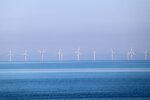Growing coalition of labor, environmental groups, and clean energy providers join forces to support new offshore wind bill
Assemblymember David Chiu (D-San Francisco) announced the introduction today of AB 525, a bill that would set a new state goal of producing 10 GW of offshore wind by 2040—and would direct state agencies to begin planning for and addressing barriers to the development of a new large-scale offshore wind industry in California. The bill, co-sponsored by the State Building and Construction Trades Council of California and Environment California, also sets an interim offshore wind target of 3 GW by 2030.
After California’s landmark climate legislation, SB 100 (2018), set a state goal of transitioning to 100% clean energy by 2045, a recent joint energy agency study concluded the state will need at least 140 GW of renewable energy and storage to meet that target. AB 525 lays out a roadmap for cost-effectively producing a significant percentage of the clean energy California needs.
Asm. Chiu’s bill is supported by a growing coalition of clean energy advocates, environmental groups, and labor unions. Together, these groups recognize that offshore wind will be a critical source of clean, reliable energy for California, one that can help power the economic recovery and create thousands of well-paying construction jobs as the state transitions to a 100% clean electric grid.
“California has set ambitious goals for building a cleaner, greener economy, and we will need an equally clean, green electric grid to provide power to every community 24 hours a day—all year long,” said Assemblymember David Chiu. “Offshore wind is a tested, proven technology that can provide huge amounts of renewable energy, with minimal environmental impacts, complementing California’s enormous solar fleet by providing power in the evening hours and through the night. There is work to be done to get these resources online, and this bill gives the state achievable energy production targets that will allow us to start the planning, permitting, and workforce preparation we need to meet them.”
As California looks for ways to reboot the state’s economy in the wake of COVID-19, offshore wind offers an opportunity to create significant numbers of steady, well-paying jobs. During the construction phase alone, 10 GW of offshore wind production would create up to 14,000 annual jobs, along with another 3,000 operations and maintenance jobs. AB 525 includes strong labor provisions that will lead to development of a skilled and trained workforce for offshore wind in California, and provide other sustained, equitable wage and economic development benefits.
“The Building Trades in California have built the vast majority of the utility scale solar, wind, hydroelectric, geothermal and pumped storage making California a global leader in renewable energy,” said Robbie Hunter, President of the State Building and Construction Trades Council of California, representing nearly half a million hardworking construction workers statewide. “Offshore wind is the next frontier and our highly skilled workforce is positioned to bring a new, limitless and reliable green energy source onto California’s grid. If you will, it’s a wind-win.”
The 10 GW goal in AB 525 reflects the findings of last year’s SB 100 Joint Agency Report, produced by the California Energy Commission, California Public Utilities Commission, and California Air Resources Board, which concluded that at least 10 GW of offshore wind is needed to cost-effectively achieve the state goal of producing 140 GW of renewable energy and storage by 2045. The bill’s goal setting and planning process is modeled after past efforts in California to create new markets for other clean industries, including the state’s Million Solar Roofs Initiative (established in 2006) and energy storage program (initiated by AB 2514 in 2010).
Offshore wind production goals have also proven successful in other states: As a result of the 29 GW of offshore wind targets set by seven East Coast states, there are 16 offshore wind projects in development, and offshore wind developers have announced $1.3 billion in investments in transmission infrastructure, manufacturing facilities, and supply chain development.
“Offshore wind will be an essential part of California’s transition to a clean electric grid. Renewable energy companies are prepared to invest billions of dollars to make the state a global leader in offshore wind technology, while providing clean, reliable, affordable energy,” said Danielle Osborn Mills, Director of American Clean Power-California. “We’ve seen in other states that offshore wind requires unique planning, permitting, and development considerations; none of this will happen on its own. California is falling behind on its climate goals at a time when the rest of the country is doubling down on clean energy. California needs to recommit to the infrastructure, jobs, and greenhouse gas reductions that offshore wind and other clean energy technologies can bring. This bill will ensure the state gets back on track—adding an innovative new resource to the diverse renewable portfolio we need to meet our energy goals.”
To accomplish AB 525’s goals, the bill requires state agencies to develop an implementation plan for offshore wind that will identify sufficient wind areas to meet a 10 GW target, establish a coordinated state-federal permitting process, plan for port improvements and transmission upgrades, and support the development of the skilled and trained workforce needed to build these new facilities.
The bill also requires the state to plan for and address offshore wind’s potential environmental impacts—in accordance with the state’s long-term renewable energy and greenhouse gas emissions reductions goals.
“Offshore wind could supply more clean energy than the entire state’s current electricity needs,” said Laura Deehan, State Director of Environment California. “The last year showed us what climate change is doing to our state—and how severely it will test our electric grid. Here in California, we must do everything we can to fight back—and serve as a model for the rest of the world—that means tapping all of the resources at our disposal. Offshore wind will be a key piece of the solution, and this bill will ensure the state makes it a reality.”
By accelerating the state’s transition to 100% clean energy, offshore wind will have significant environmental and community benefits, producing clean air and healthy communities across California. According to a recent report by Energy+Environmental Economics, new offshore technology also has the power to save California ratepayers up to $2 billion between now and 2040.
“This legislation will help millions of Californians access clean, reliable, and affordable electricity, while also supporting thousands of high-skill workers the state will rely on to build this new 21st century industry,” said Tim Cremins, Political Director, Western Region, International
Union of Operating Engineers. “We know the world is watching, and we’re proud to be a partner from the very beginning of this new clean technology industry.”
For more information on AB 525, a fact sheet is available here.
The American Clean Power Association formally launched in January 2021 after merging with the American Wind Energy Association (AWEA). ACP’s California project is now American Clean Power-California (ACP-California).
- Source:
- Environment California
- Author:
- Press Office
- Link:
- environmentcalifornia.org/...
- Keywords:
- USA, California, bill, offshore, foating, coast, wind farm, wind power, assemblymember, support gigawatts, interim goal, climate change, state

























